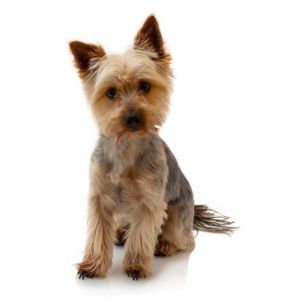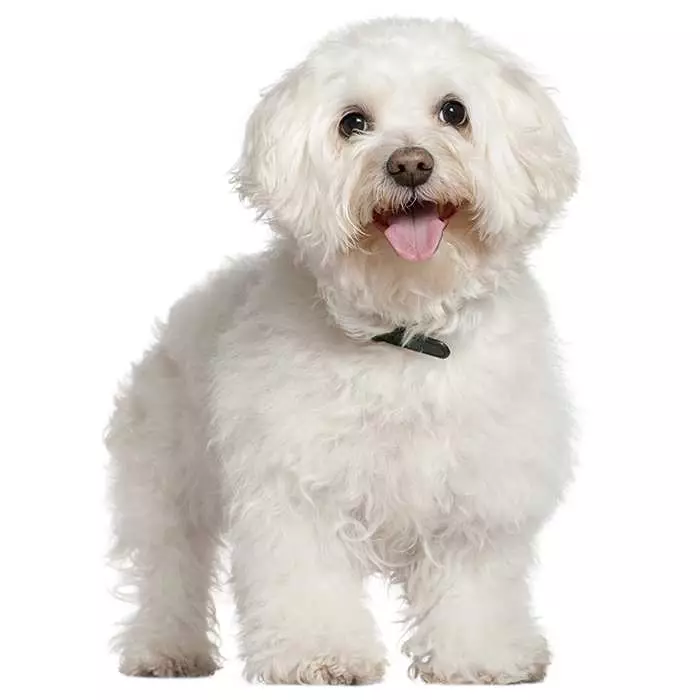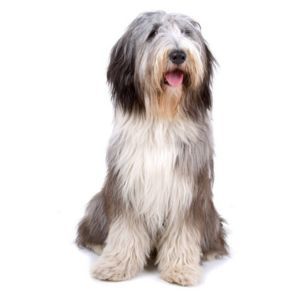Yorkshire Terrier
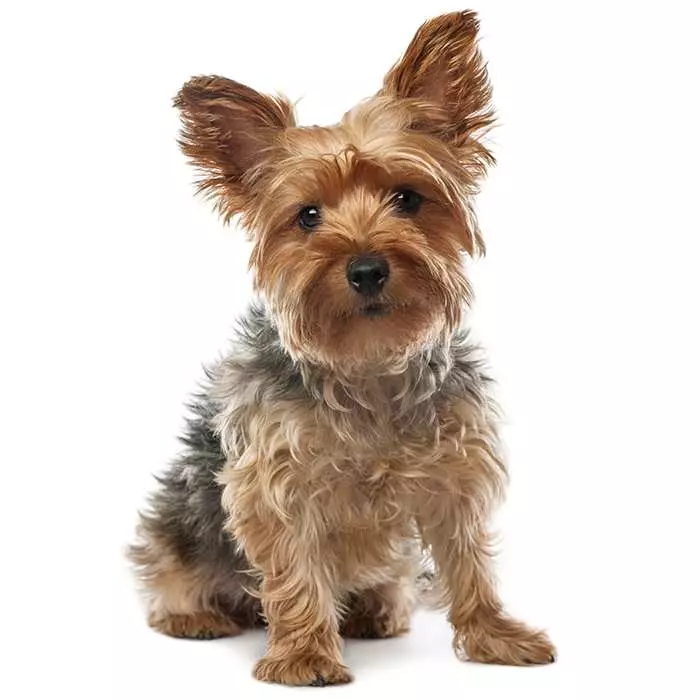

| Recommended for | Singles and families with older children |
| Breed Classification | Toy |
| Other names | Yorkie |
| Lifespan | 12-15 years |
| Size | Toy |
| Temperament | Affectionate, loyal, courageous |
| Intelligence | High |
| Tendency to bark | High |
| Maintenance Level | Low to medium |
| Health Risk | High probability of health issues during its lifetime, hence it is one of the more expensive breeds to insure. |
Insuring a Yorkshire Terrier?
Get our award-winning Nose-to-Tail Cover with up to $30k annual benefit limit, up to 90% of eligible vet bills back, and no sub-limits.
Get a quick quote
Is this breed right for you?
Try our breed selector quiz to find out your best matching breed!
Insuring a Yorkshire Terrier?
Get our award-winning Nose-to-Tail Cover with up to $30k annual benefit limit, up to 90% of eligible vet bills back, and no sub-limits.
Get a quick quote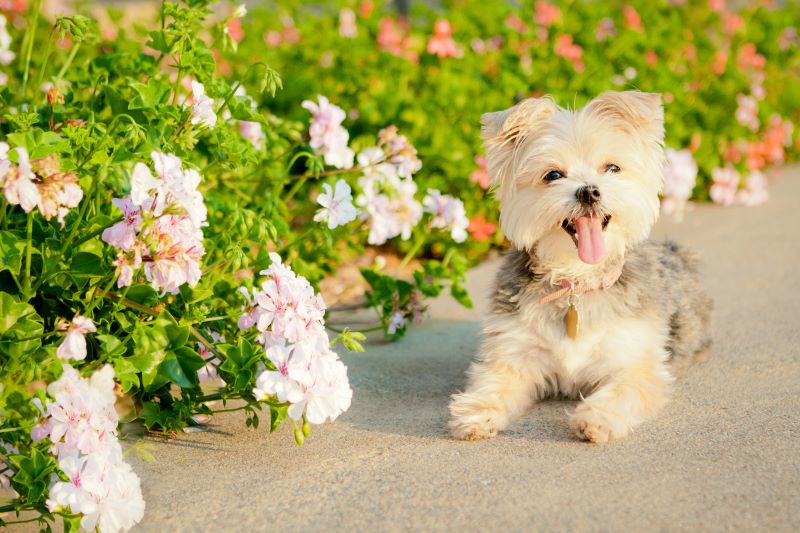
Breed history of Yorkshire Terriers
The Yorkshire Terrier, named after Yorkshire, northern England, was developed in Scotland from the cross-breeding of many small terriers, possibly including the Clysedale Waterside, Paisley, Skye, Dandie Dinmont and Black and Tan English Terriers. The Clyesdale Waterside Terrier, which was small with long greyish blue hair, played an important part in the creation of the Yorkshire Terrier, especially in terms of its appearance.
Then called Scotch Terriers, they were brought south to Yorkshire by Scottish weavers around the 1850’s. There the breed was developed into the Yorkie we know and love today. At first very much a working class dog, by late Victorian times the diminutive yet elegant Yorkie had found favour with English ladies as a beribboned lapdog.
The known first Yorkshire Terrier in Australia was “Punch,” who was exported to Brisbane from England in 1872 by Mr J Spink. Punch was a close relative of the first registered Yorkshire Terrier in the United Kingdom, Huddersfield Ben, who is regarded as the father of the breed.
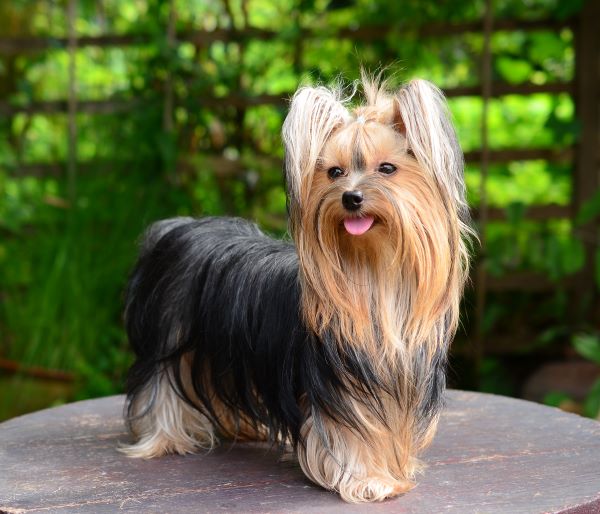
Physical description of Yorkshire Terriers
Among the smallest of the Terriers and in fact all dog breeds, the Yorkshire terrier is a tiny, toy-sized dog known for its long, silky, straight coat that keeps growing and can reach the floor.
With their tiny size, household accidents are one of the biggest risks to Yorkshire Terriers. Because they love to follow their owners around and can often sneak up quietly behind you, their small frame can be prone to broken bones or worse.
The Yorkie’s coat is its most outstanding feature, distinguishing it from all other small breeds. The Yorkie comes in a colour combinations of steel blue (on the body and tail) and tan, blue & gold, black & tan, and black & gold.
| Weight range | 2 to 4 kg |
| Height range | 15 to 18 cm |
| Colours | Blue & gold, blue & tan, black & tan, black & gold |
| Coat length | Long |
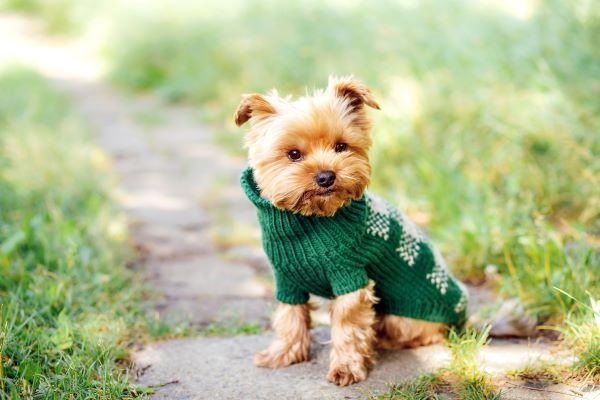
Yorkshire Terrier personality and temperament
Tenacious, feisty, brave, and sometimes bossy, the Yorkie exhibits all the traits of a true terrier. Packed with personality, the Yorkie is entertaining, loving and a close companion.
Despite their tiny size, it is important to raise and treat Yorkies as real dogs; if they don’t get clear rules, they will show everybody that they are in charge. Yorkies are prone to Small Dog Syndrome, which occurs when owners allow their dog to get away with things they would not allow a larger dog to, which can lead the dog to believe they are the pack leader.
Some believe the Yorkie to be a “yappy” breed, but many owners find that when its needs are satisfied, it is a quiet and happy dog. On the plus side, their tendency to bark makes them great watchdogs.
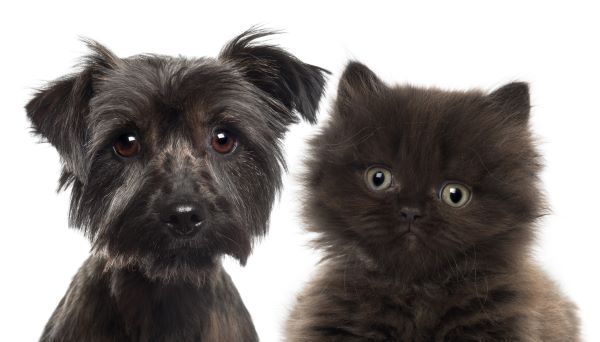
Yorkshire Terriers with kids and other pets
Yorkshire Terriers are not recommended to households with young children, as they can often treat the dog as a toy and play too roughly or drop or step on them. It is essential that young children are watched carefully around the Yorkie to ensure they treat it appropriately. Another reason why raising Yorkshire Terriers with small children is not ideal, is that the breed will not tolerate any unfairness.
Yorkies generally get along well with other dogs and cats in the family. However, Yorkies don’t understand how small they actually are, and they are filled with over-confidence and bravery. When they feel like it, they will bark at other dogs or enter into a stand off with a bigger dog without fear, and may sometimes need rescuing!

Yorkshire Terrier training and exercise
Yorkshire Terriers may be small, but they are energetic little dogs who require moderate daily exercise such as walks and playtime to stimulate them both physically and mentally. If your Yorkie often runs around the house for no reason, this could be a sign that they need more exercise. Occasional short bursts of activity, such as chasing after a ball or frisbee in the backyard, may do the trick.
Yorkies love their owners, and those who are patient and consistent with rules and are patient with their dog will have no trouble with training. Yorkies respond better to praise and rewards than they do to harsh corrections. Housebreaking can occasionally be a challenge.
| Energy level | Medium to high |
| Exercise requirements | Medium |
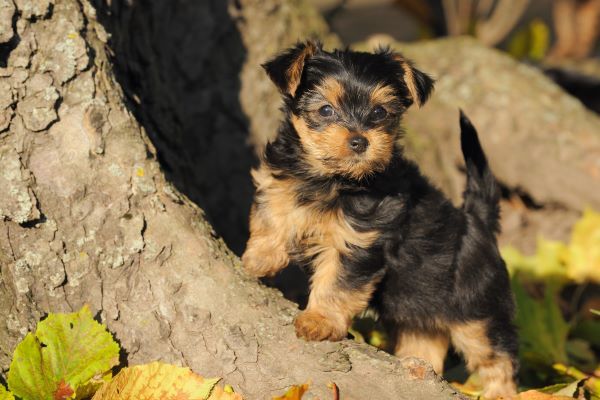
Yorkshire Terrier feeding and nutrition
The Yorkie has a fairly small appetite and a large tablespoon of food once or twice per day should be sufficient for adults the breed (with up to four meals per day for puppies and adolescents). A high-quality, balanced and wholesome dog food that is appropriate for its age (puppy, adult, or senior), size and activity level is recommended.
Yorkies can become overweight so it’s important to monitor their weight and calorie consumption. Avoid feeding table scraps or overindulging them with treats. Check with your vet if you have any concerns about your dog’s weight or diet.
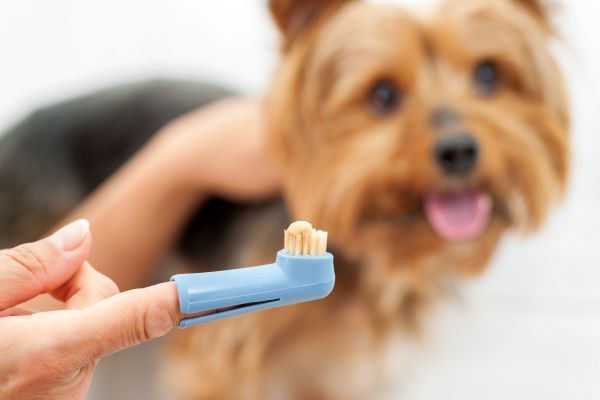
Yorkshire Terrier care and grooming
The Yorkshire Terrier’s hair is similar to human hair and can grow particularly long, especially around the face, which may require trimming in order to prevent it dipping into the food or water bowl. The hypoallerginic Yorkie does not have an undercoat and doesn’t shed much.
The lustrous Yorkie coat can and will look its best only with constant grooming and attention from the owner. Particularly if the coat is kept long, it needs to be brushed daily and shampooed weekly to maintain its shine, and the hair on the Yorkie’s head often needs to be tied up in a topknot to keep it from obstructing their vision. Alternatively, the coat can be clipped in an extremely cute, fluffy style which is easier for time-poor owners to manage.
Health issues for Yorkshire Terriers
- Patellar luxation is a common issue among small dog breeds, and occurs when the patella is not lined up properly, causing the knee cap to fall in and out of place. This can lead to lameness or an abnormal gait in the dog, but for dogs affected with only mild cases, no treatment is required and they can lead normal lives. For more serious cases, surgery can be performed in order to correct the patella.
- Progressive retinal atrophy refers to a family of eye conditions which lead to the gradual deterioration of the retina, causing first night blindness, then full blindness. There is no cure, but many dogs adapt easily to the loss of sight and can lead relatively normal lives, as long as their environment does not change too drastically.
- Cataracts refer to a cloudy membrane forming over the eye causing vision impairment. Causes include genetics, age, trauma and metabolic diseases such as diabetes. They can be removed surgically.

- Portosystemic shunt is a condition which affects the flow of blood between the liver and the rest of the body. Because the liver controls detoxing and metabolism, this can be a serious issue. Signs of the condition include abnormal behaviour, loss of appetite, low blood sugar, gastrointestinal issues, urinary tract issues, intolerance to medication and stunted growth. Corrective surgery is an option, and a special diet may be prescribed to help combat the issue.
- Collapsed Trachea occurs when the trachea, which carries air to the lungs, collapses, causing a dry, hacking cough often sounding like a goose honk. Surgery can be performed to fix the trachea and medication may also be prescribed.
- Reverse sneezing can occasionally be confused with a collapsed trachea, but is much less serious. It occurs when the dog becomes over-excited, drinks/eats too quickly, or if there is an increased amount of irritants in the air. Though it can be scary to witness, it will stop as soon as the Yorkie relaxes. Stroking the dog’s throat may help the dog calm down.
- Other Issues: Yorkshire Terriers can also experience eye infections, anaesthetic intolerance, bronchitis, tooth decay and gum disease.
Not all conditions are covered by Pet Insurance. For details of Bow Wow Meow Pet Insurance cover, refer to the Product Disclosure Statement.
Free engraved pet ID tag on sign up3
Customer Satisfaction
21 day cooling off
24/7 Live Vet^ care

GapOnly® in vet claims
SEE MORE
Yorkshire Terrier Club of NSW: http://www.yorkshireterrierclubnsw.com
Yorkie Queensland: http://www.yorkieqld.com/about_us

 Smoky, a famous Yorkshire Terrier who served in World War II, is credited with a surge in popularity of the breed. Smoky survived 150 air raids and was awarded 8 battle stars.
Smoky, a famous Yorkshire Terrier who served in World War II, is credited with a surge in popularity of the breed. Smoky survived 150 air raids and was awarded 8 battle stars.